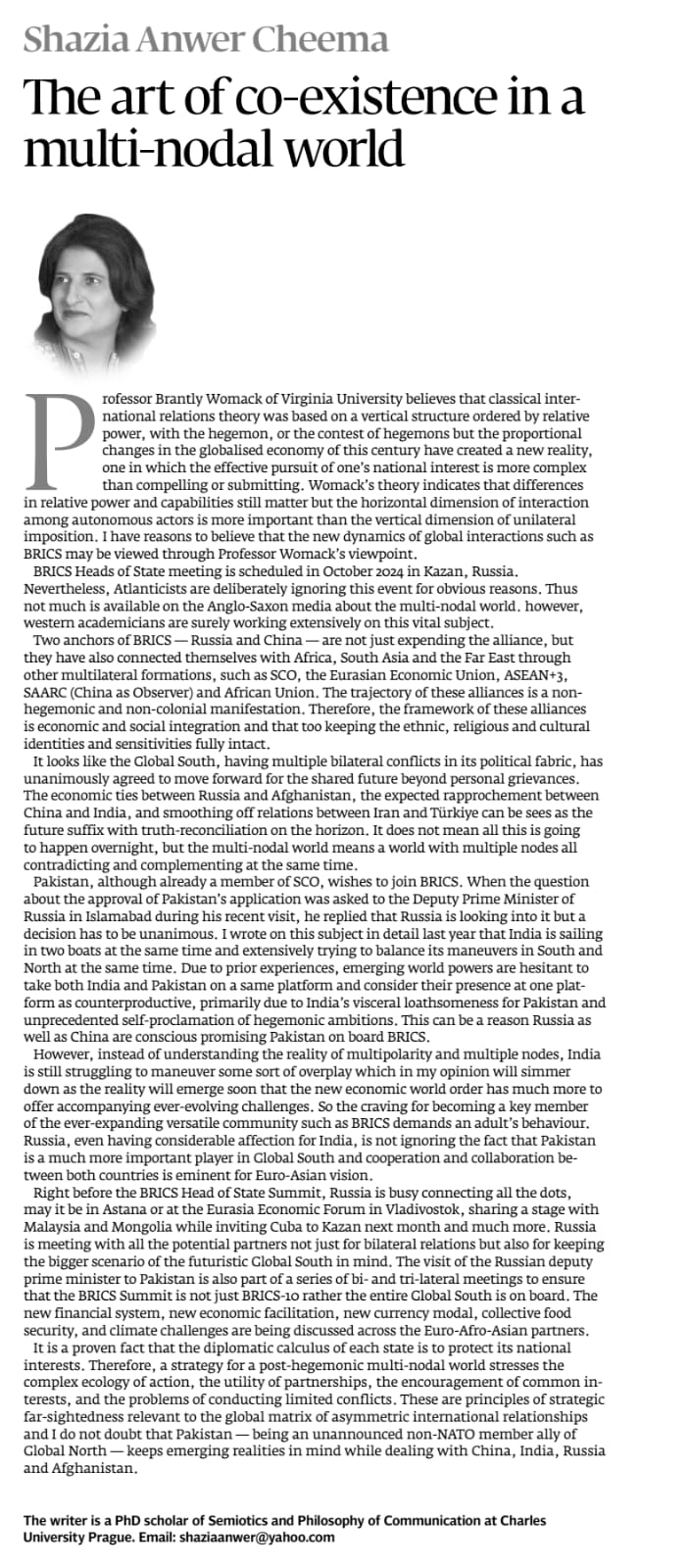Monitoring Desk: “Pakistan being an unannounced non-NATO member ally of Global North must keep emerging realities in mind while dealing with China, India, Russia, and Afghanistan and must accept the reality that Russia, as well as China, are consciously promising Pakistan board at BRICS”.
These observations were mentioned in an article titled ‘The Art of co-existence in a multi-nodal World’ written by foreign affairs expert Shazia Anwer Cheema, which was published in Express Tribune on Friday.
The writer is of the view Pakistan is already a member of SCO and wishes to join BRICS but the journey may not be easy for Pakistan the Deputy Prime Minister of Russia in Islamabad during his recent visit indicated Russia is looking into the issue of membership of Pakistan in BRICS but a decision has to be unanimous. India is sailing in the two boats at the same time and extensively trying to balance its maneuvers in the South and North emerging world powers are hesitant to take both India and Pakistan on the same platform and consider their presence on one platform as counterproductive primarily due to India’s visceral loathsome for Pakistan and unprecedented self-proclamation of hegemonic ambitions.
The writer is of the view that Russia has cordial relations with India but is not ignoring the fact that Pakistan is a much more important player in the Global South and cooperation and collaboration between both countries is eminent for Euro-Asian vision but at the same time, Russia is busy connecting all the dots, meeting with all the potential partners not just for bilateral relations but also to keep the bigger scenario of the futuristic Global South in mind. The visit of the Russian deputy prime minister to Pakistan is also part of a series of bi-and tri-lateral meetings to ensure that the BRICS Summit is not just BRICS-10 rather entire Global South is on board. The new financial system, new economic facilitation, new currency modal, collective food security, and climate challenges are being discussed across the Euro-Afro-Asian partners.

Citing the international relations theories of Professor Brantly Womack of Virginia University, the writer adds classical international relations theory was based on a vertical structure ordered by relative power, with the hegemon, or the contest of hegemons but the proportional changes in the globalized economy of this century have created a new reality, one in which the effective pursuit of one’s national interest is more complex than compelling or submitting and differences in relative power and capabilities still matter but the horizontal dimension of interaction among autonomous actors is more important than the vertical dimension of unilateral imposition.
‘It is a proven fact that the diplomatic calculus of each state is to protect its national interests, therefore a strategy for a post-hegemonic multi-nodal world stresses the complex ecology of action, the utility of partnerships, the encouragement of common interests, and the problems of conducting limited conflicts. These are principles of strategic far-sightedness relevant to the global matrix of asymmetric international relationships and I do not doubt that Pakistan’s Foreign office keeps emerging realities in mind while dealing with China, India, Russia, and Afghanistan while being an unannounced non-NATO member ally of Global North, concluded the writer.
The writer believes that economic ties between Russia and Afghanistan, the expected rapprochement between China and India, and smoothing off relations between Iran and Türkiye, can be seen as the future suffix with truth-reconciliation on the horizon. It does not mean all this is going to happen overnight but the multi-nodal world means a world with multiple nodes all contradicting and complementing at the same time.
